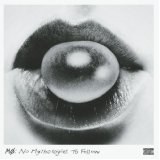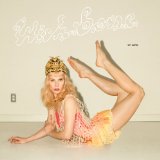 On paper at least it would appear that MØ is unlikely to deviate much from what is a well-established and superior brand of Scandi-pop. With this album being three years in the making, the Copenhagen based twenty-five year old has had time to hone her preferred blend of r’n’b pop with trap leanings and an occasional wander into 1960s reverb-heavy girl group territory. Her competition is undoubtedly strong; Lykke Li, Annie, Robyn and Oh Land to name a few of the female singers who have already demonstrated their worth in the genre over the last decade. But MØ can thankfully hold her own more often than not on this, her debut album, “No Mythologies to Follow”.
On paper at least it would appear that MØ is unlikely to deviate much from what is a well-established and superior brand of Scandi-pop. With this album being three years in the making, the Copenhagen based twenty-five year old has had time to hone her preferred blend of r’n’b pop with trap leanings and an occasional wander into 1960s reverb-heavy girl group territory. Her competition is undoubtedly strong; Lykke Li, Annie, Robyn and Oh Land to name a few of the female singers who have already demonstrated their worth in the genre over the last decade. But MØ can thankfully hold her own more often than not on this, her debut album, “No Mythologies to Follow”.
Album opener “Fire Rides”, one of the new songs which represent the minority here, as over half the album has already been released, is a perfect introduction to MØ’s style and sound. Following a near acapella flurry of swooping, angelic vocals, stop-start post Timbaland beats hit hard against the melancholic melody line before a rave synth adds another, more angular dimension to the chorus. It may sound crowded but it’s a sublime merging of styles. Most impressive of all though are MØ’s vocals, full bodied and soulful with an impressive and expressive range that her contemporaries can’t match. The apocalyptic metaphors on “Fire Rides” are bought to life with her possessed performance on the haunted and yearning verses:
‘What’s it gonna be with the violence?
What’s it gonna be when the fire rides in?
What’s it gonna be when the sound of you and I die out?’
“Maiden”, “Pilgrim” and “Waste of Time” are all previous singles and further represent MØ’s fixation with the music she grew up with. Much like Grimes, contemporary futuristic r’n’b and hip hop have been essential influences to her along with electronic pop music and an ability to subvert these genres subtly and without irony but with heart; this is her specialty. “Maiden” introduces a classic nylon-strung guitar sound that crops up more than once in the album’s playing time and it’s to her credit that she applies these odd stylistic flourishes to her sound and makes it something that is identifiable to her and without contrivance. Producer superstar Diplo appears on the brassy and low-slung “XXX 88” and it’s maybe not surprising that it’s the most commercial moment here but also completely in keeping with the sonic themes of the album. “Don’t Wanna Dance” and the slowly chiming “Never Wanna Know” in particular pay a brilliant homage to Motown and girl group dilemmas and sonics. Both tracks are wonderfully conceived and a perfect for MØ’s longing and alienated vocals, “Never Wanna Know” has a divine spoken interlude that draws the line from The Shangri-Las to All Saints, it may be an easy pull but it certainly hits in all the right places
‘All of a sudden I was brain dead and rotten
With thoughts of you and I
And I wanted to ‘goodbye’ you
But the nights are so cold
How I missed your human soul
I would never let you go if I’d been a little older’
he less successful songs here, and there only a few, are also the newer ones. “Red in the Grey” has a pretty straight forward trap arrangement but is more of a re-tread of earlier material rather than a fresh update. “Dust is Gone” continues with the sixties thread but the lack of a strong song and Lana Del Rey aping render it redundant karaoke. The clanking and clapping “Walk this Way” and the gorgeous “Slow Love” with its opulent, misty funk fare much better. Compare any of these tracks though to the older and eccentric “Glass”, the closing song here, with its deeply disconcerting festive synth hook, massive pop chorus and general oddness, and these tracks fail to fully measure up.
“No Mythologies To Follow” may not be as instantly gratifying as one may have expected given a genre that all too often and easily is written off as disposable. This is an album that initially is difficult to warm to and a fairly steady mid tempo throughout can provoke a feeling of sameness. This proves to be a strength as opposed to any kind of weakness however as repeated listens reward enormously as buried melodies and hidden embellishments are excitingly revealed over time. MØ has already managed to establish her own style and found a voice which allows her access to the hallowed music hall of Swedish Pop (a copy of Abba’s “The Visitors” is given to all wannabes as homework) but she also cleverly sets herself apart from her contemporaries effortlessly and with some aplomb. MØ is indeed something quite special: an awkward and talented woman challenging her inhibitions and desires through frequently beautiful and slow burning music that is, at times, equally awkward.
 Since recording her occasionally twee, but consistently charming self- titled debut from 2011, Danish electronic pop singer-songwriter Oh Land has been listening to a lot of rap and the influences of this genre can be heard all over the tight and tough follow up,” Wishbone”. The stark, attention-seeking cover portrait alone projects enough star power to confirm that Nanna Ohland Fabricius means business this time; just try not to stare at it. Along with the recruitment of David Sitek, TV on the Radio member and fast becoming the most inspired alt-pop producer to emerge after the last couple of years (Beck, Beady Eye, Yeah Yeah Yeahs and CSS), the promise of something both unexpected and immediately compelling is met almost without exception.
Since recording her occasionally twee, but consistently charming self- titled debut from 2011, Danish electronic pop singer-songwriter Oh Land has been listening to a lot of rap and the influences of this genre can be heard all over the tight and tough follow up,” Wishbone”. The stark, attention-seeking cover portrait alone projects enough star power to confirm that Nanna Ohland Fabricius means business this time; just try not to stare at it. Along with the recruitment of David Sitek, TV on the Radio member and fast becoming the most inspired alt-pop producer to emerge after the last couple of years (Beck, Beady Eye, Yeah Yeah Yeahs and CSS), the promise of something both unexpected and immediately compelling is met almost without exception.
“Wishbone” is Oh Land’s declaration of change and of the strength required to achieve it. Many of the songs use fighting or violent metaphors to get the message across, but are then off set against lush, warm restorative retreats. Album opener “Bird in An Aeroplane” is a strange, weary-sounding minor key, synth pile-up; it’s also a very good pop song but not fully realised on first listen. Like some of Sitek’s other productions, the fun is unravelling and exposing a song’s real intentions, which can sometimes take time. At the other end of the spectrum, “Renaissance Girls” furiously changes the tone with its scatty mania and staccato melody, Oh Land dazzling with exuberant vocals. It’s one of the most self-possessed pop songs of the year.
“Love a Man Dead”, “Kill My Darling” and, in particular, “My Boxer”, which sees Oh Land reunite with producer Dan Carey (MIA, Bat For Lashes and Kylie), form a trilogy of sorts of part-rapped, part-sung concise muscular electro pop tracks. David Sitek again changing musical tack with “Pyromaniac” which is loose and funky and with its celebratory woo-hoo’s is The Cardigan’s classic “Lovefool”’s older sister. The twinkling “Sleepy Town” and doomy, two note piano chime of “Next Summer “(‘Put me to sleep and don’t wake me up, until time has changed please let’s fast forward the clock’), both topped with deceptively sweet vocals, successfully take the theme of small town resentment and boredom into mid tempo territory along with the finger snapping r’n’b of “Cherry On Top”.
“Green Card” is a majestic, rolling Sia co-write and is a success of proportion and restraint; trumpets swell and Oh Land’s elaborate vocals demonstrate the skill and versatility of her vision and talent. The wheezy and dilapidated electronics on album closer “First to Say Goodnight” mimic more than anywhere else here the overall sonic atmosphere of Sitek’s successful collaboration with Scarlett Johansson on her album of Tom Waits covers “Anywhere I Lay My Head”. Where Johansson’s voice was never much more than a remote smudge or drawl, Oh Land’s clear and intimate vocals pull you much closer to the sentiment and sound beautiful alongside the ornate, drunken musicbox soundtrack.
Robyn, Lykke Li, Dragonette and Annie make vivid, revered and, to many, cultish pop music of various shades. Oh Land, like several similar acts, has been on the periphery of this greatness for a little while now but “Wishbone” sees her nudge her way into this very special group with an album that, in addition to cementing her own unique identity, is a delirious and thoughtful collection of pop beauty.


